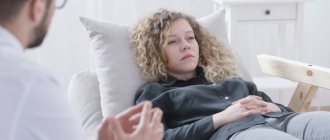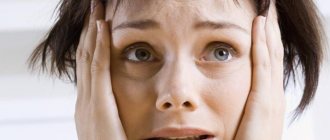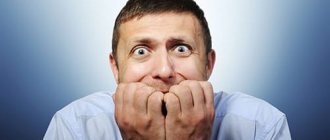Nocturnal panic attacks, sometimes called “nighttime panic attacks,” can occur either during sleep or while trying to fall asleep. They are characterized by a sudden onset of fear, and usually lead to a variety of unpleasant physical symptoms. These may include:
- Cold sweat
- Cardiopalmus
- Hyperventilation and shortness of breath
- Fluctuations in body temperature (fever or chills)
- Chest pain
- A depressing feeling of doom
Panic attacks usually don't last more than 10 minutes, but the effects (which can be emotional, physical, and cognitive) can last a long time.
Why do panic attacks happen at night?
At night, we are left alone with our fears. It is easier to escape from worries and unpleasant thoughts during the day than at night. If a person is prone to anxiety and has a number of accumulated problems, or is experiencing stress, then the likelihood of nighttime panic attacks increases.
In this state, our brain is in “defense mode,” constantly monitoring for threats, including any changes it senses in the body. So if you go to bed feeling tense, when your body begins to relax, it may perceive it as something dangerous and trigger a stress response. Panic attacks are your body's way of protecting you.
Causes
The mechanism behind the formation of panic attacks is not yet known. There is a theory that an attack is provoked by negative thoughts that provoke the release of adrenaline. The growth of the hormone in the blood leads to increased heart rate, breathing, and increased blood pressure. Adrenaline blocks the receptors responsible for inhibition, and excitement, anxiety, and fears increase. During an attack, a person may be afraid of losing consciousness, which leads to dizziness and numbness of the limbs.
The following reasons can also provoke attacks:
- heart attack;
- cardiac ischemia;
- childbirth, pregnancy;
- menopause;
- an adrenal tumor that interferes with the synthesis of adrenaline;
- thyrotoxic crisis;
- thyroid diseases;
- long-term therapy with hormonal drugs;
- severe stress;
- hereditary history of anxiety or mental disorders.
Provoking factors
In addition to the reasons that directly change the functioning of the autonomic system and the release of adrenaline, norepinephrine, and dopamine, there are also risk factors that increase the likelihood of a panic attack in a healthy person. These include:
- drug and alcohol abuse;
- lack of physical activity – physical inactivity leads to restlessness, impulsiveness and panic attacks;
- smoking;
- chronic lack of sleep;
- constant suppression of emotions.
Nightmares
Panic attacks that occur during sleep are usually caused by nightmares. Nightmares are considered a form of sleep disorder that affects the nervous system, causing unusual behavior.
Nightmare
Nightmares are episodes of intense fear during sleep, usually occurring in the first third of the night. You may wake up terrified with a frantic intensity of physical symptoms that trigger a panic attack.
Symptoms
A panic attack is an attack that can last from a few minutes to several hours. The average duration of one attack is 30 minutes. The frequency of attacks for some is 1-2 times a day, for others – several times during the month. But once a person experiences it, he will remember the attack for the rest of his life.
Mental
The mental symptoms of panic attacks are more pronounced. In some cases, a feeling of trouble and danger forces a person to hide and limit communication. The attack is accompanied by the following symptoms:
- panic;
- fear;
- increased anxiety;
- confusion of thinking;
- feeling of a “lump in the throat”;
- impaired perception of reality;
- loss of control over one’s own actions and events;
- clouding of mind;
- a feeling of unreality of what is happening;
- rises in sleep, nightmares.
Physical
The cause of physical symptoms is stimulation of the autonomic nervous system, the release of adrenaline, norepinephrine, and dopamine into the blood. This causes the following symptoms to appear:
- hot or cold flashes;
- cardiopalmus;
- chills;
- increased body temperature;
- hand trembling;
- dyspnea;
- feeling of lack of air;
- hard breath;
- nausea, bowel dysfunction;
- increased urination;
- convulsions;
- blood pressure surges;
- temporary hearing and vision impairment;
- dry mouth;
- sweating
Get help now
Do any of your relatives or friends have an addiction? Have you tried in every possible way to help, but as a result the person still returned to his past life?
You are not the first to encounter this problem, and we can help you.
We guarantee anonymity, we will persuade you to undergo treatment, and we will help you choose a center.
Call us
+7
or
Call me
What to do when attacks occur before bed?
As mentioned above, at night we often begin to process all the stresses of the day or worry about the day ahead. Panic attacks before bedtime usually occur during stressful moments in life, when our head is filled with problems. Maybe these are quarrels in relationships, conflicts at work, a period of painful changes.
After we've had a panic attack, worrying about it happening again can create a vicious cycle in which we become afraid to fall asleep. Although this type of reaction is considered normal, it often causes even more concern.
What to do if you have a panic attack at night
If you are having a panic attack, experts advise taking the following steps:
- Close your eyes and inhale slowly and deeply through your nose.
- Then exhale slowly and deeply through your mouth.
- If you can, continue this process as long as it lasts, counting 1 - 5 on each inhalation and exhalation.
Try to accept that you are experiencing a panic attack without any resistance. When we try to fight anxiety, we only make it worse. It can be scary, but try to move towards the anxiety rather than away from it.
Panic attack
Once you feel better, the worst is over. Just remember – your body is on high alert right now, so it will likely take some time to calm down again. So sleep is out of the question for a while.
Conclusion
Panic attacks are often unreasonable fear and anxiety that arise under the influence of some traumatic factor on a person. The attack itself is not dangerous, but against the backdrop of uncontrollable fear, a person can commit rash acts, and frequent disorders disrupt his life. A constant feeling of fear and anxiety leads to insomnia, refusal to eat, severe exhaustion and exacerbation of chronic diseases. Panic attacks need to be treated and can be eliminated with psychotherapy, medication and lifestyle changes.
Tips on what to do after an attack
- Go to the bathroom and splash some cold water on your face. The cold causes a shock in the system, which prompts the body to go into survival mode, ultimately lowering the heart rate.
- Then try to find a simple activity that will calm you down. Wash the dishes, sweep the floor, clean out the refrigerator. Whatever you choose, do it in such a boring and mundane way that it requires minimal mental effort. Remember, you are not trying to distract yourself here, you are just doing normal, run-of-the-mill activities while your symptoms begin to subside.
- If you wake up sweaty, take a warm shower, put new sheets on your bed, and put on your comfiest pajamas. Having removed the physical evidence of a panic attack, we will start over and return to sleep as quickly as possible.
- Gradually you will begin to feel your body begin to relax. Return to bed only when you are ready. If it's not time yet, try meditating or taking a few deep breaths until your body begins to calm down again.
Remember the main thing, no matter how terrible panic attacks are, they cannot cause us physical harm.
Approaches to the treatment of panic disorder
The most effective is the combined treatment of panic disorder - a combination of drug treatment with psychotherapy
.
Selection of an individual treatment regimen
is possible only after a thorough examination and is carried out taking into account all
the characteristics of the disease
.
When determining therapeutic tactics
the following factors are taken into account: duration of the disease, the patient’s attitude to pharmacotherapy, previous treatment experience, the nature and severity of emotional disorders, the nature of the psychogenic situation, the degree of social maladaptation, the presence of concomitant somatic disease.
Benzodiazepine tranquilizers are most effective for relieving PA.
.
Antidepressants are also effective in treating panic disorder
. It is recommended to use SSRIs (selective serotonin reuptake inhibitors) or SNRIs (selective serotonin and norepinephrine reuptake inhibitors).
An integral component of the treatment of panic disorder is psychotherapy, which is used both independently and in combination with pharmacotherapy. It is known that in a high percentage of cases the effect can be achieved only with the help of psychotherapy. The most important goal of psychotherapy is to gradually bring patients to an awareness of the essence of their psychological conflict and then to a gradual modification of previous inadequate schemes and attitudes and, ultimately, the development of a new, more harmonious and flexible system of views and relationships, more mature adaptation mechanisms, restoration of self-control and adequate response.
Non-medicinal products are also used
(physiogenic, psychotherapeutic)
methods for relieving
panic attacks:
- regulation of breathing (breathing into folded palms, breathing with the stomach - exhale longer, slower than inhale)
- distraction (concentrating attention on surrounding objects and events; physical activity; singing; walking; counting; auto-training)
- massage (shoulders, neck, little fingers, base of thumbs).
How to stop nighttime panic attacks
Talking to a therapist can help you address the root of your anxiety and find tools to create real, lasting, positive changes in your life. At the same time, performing nightly exercise can help create a nurturing environment for your body to naturally calm down and prepare you for sleep.
- Try talking to your partner, family member or friend about what's bothering you. Take a bath or warm shower before bed. The heat will help relax your muscles and body.
- Keep a pen and paper handy. If you start to worry about things or tasks, write them down (or add them to a list on your phone). Worrying at night when you can't do anything about them is useless. Once you write it down, you can return to it at a more convenient time.
- Eliminate alcohol from your life for a while. While alcohol can temporarily numb our worries, it is also a serious stimulant for anxiety. The same goes for caffeine. Make sure you don't drink tea or coffee after 6pm.
- Be active. Never forget the importance of exercise.
- The next time you're trying to sleep, try taking your mind off the dream and focusing it on your physical sensations instead. Think about how good it feels to be in bed.
- When negative thoughts arise, imagine locking them in a small box and throwing away the key. Remind yourself: now is not the best time to think about it.
- Set yourself a designated “worry time.” It's half an hour of the day where you allow yourself to worry about as many things as you want. When you start worrying outside of these times, remind yourself so you can forget about it until next time.
- If you have trouble falling asleep for a long time, get out of bed and do something until you start to feel sleepy again. Your bed should be your sanctuary for sleep and it is important that you do not start associating it with any anxious, sleepless nights.
- Some people find that certain foods can cause anxiety. The next time you have a panic attack at night, try writing down what you ate before bed. And as soon as you make a list, start removing these products one by one until the panic attacks stop.
If you suffer from panic attacks, then your anxiety level is very high. Please remember: You do not have to go through this alone. Seek support if panic attacks begin to interfere with your ability to enjoy everyday life.
General recommendations
Maintaining the correct daily routine is an important point in the fight against nervous tension.
You need to create your daily routine in such a way that there is enough space for both work and rest. It is also important to alternate between work and rest.
Sound and healthy sleep is something you desperately need. Moreover, it should occur precisely at night and be at least 8 hours a day.
You will have to eliminate alcohol and other stimulating drinks : coffee, strong tea. They excite the nervous system and prevent you from relaxing. Instead, drink soothing herbal infusions based on mint, lemon balm, chamomile, and linden.
Review your diet . Leave only healthy food in it. More vegetables and fruits are beneficial.
Constantly repeat to yourself that sport is your assistant in the fight against relapses of panic attacks. This is an excellent method for relieving tension and releasing negative energy. It increases the level of endorphins in the blood and reduces the amount of stress hormones. In addition, sports will allow you to abstract from your problems. Believe me, a hundred jumping ropes will bring you out of the blues and save you from gloomy thoughts.
In addition, physical exercise improves blood circulation, eliminates muscle tension, and liberates the body. It gives self-confidence, activates thinking, teaches self-control, and, of course, tightens the figure, makes it slimmer, and the image more harmonious. You will receive enormous benefits from playing sports, improve your sense of self and self-perception, and free yourself from certain complexes.









